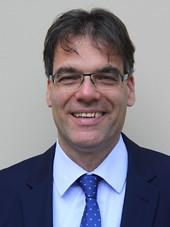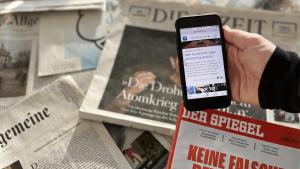Asset Publisher
Freedom of expression and press in Latin America
Asset Publisher
Freedom of expression and freedom of the press are essential components of democratic societies. Unfortunately, these rights have been continually restricted for years in many regions of the world. Even in democracies, the free and independent press faces major challenges.
In many Latin American countries, governments systematically target investigative journalists to prevent access to freely published news and information for the people. Harassment and stigmatization of the media, fed by online disinformation and persecution, have especially increased against journalists who hold government accountable in their platforms.
According to Reporters Without Borders in 2022, countries such as Cuba (173rd), Honduras (165th), Nicaragua (160th), Venezuela (159th), Colombia (145th), Mexico (127th), Bolivia (126th), Guatemala (124th), El Salvador (112th) and Brazil (110th) are located in the bottom third of the global index “World Press Freedom”. The ranking aggregates indicators such as pluralism of opinion, independence of media landscapes, censorship, legal framework, infrastructure, transparency and attacks on journalists in 180 countries and territories.
Our overview page gives an insight into the various dimensions of the recent setbacks in freedom of press and of expression in Latin America.
Disinformation in digital platforms
In today’s digital age, people can disseminate information with millions of others in a single click. Nevertheless, the digital world raises challenges for human rights and democratic governance. The internet has enabled a new way to consume and reproduce information with very little regulation, which allows a rapid spread of false and misleading information throughout social networks. In addition, as distrust in facts grows, it becomes more difficult to identify whether a certain information can be credible or not. According to the Freedom on the Net, online content manipulation has been contributing to an overall decline in internet freedom.
During the COVID-19 pandemic, several countries in the world witnessed the fast spread of fake news characterized by inaccurate information about the number of cases and deaths, prevention measures and treatment, as well as by discreditation of science. Furthermore, many governments have used the allegation of combating fake news related to the pandemic as a pretext to restrict freedom of press and expression in digital platforms by limiting the access to information, censoring critical speech and increasing digital surveillance over journalists. According to an assessment led by Freedom on the Net governments in 28 countries worldwide blocked legitimate websites and censored online media outlets to suppress unfavourable health statistics related to the pandemic and critical reporting1.
In Argentina, government agencies under the authority of President Alberto Fernández promoted two initiatives responsible for fact-checking information related to the COVID-19 to fight what has been described as “infodemic”, though both of them are related to government agencies. The establishment of these initiatives by the state, while discrediting other non-governmental initiatives, can be seen as subtle and indirect censorship according to the Asociación de Entidades Periodísticas Argentinas (ADEPA)2. Dictating which source of information should be taken into consideration by state bodies can present a threat to freedom of expression and press.
Following this political pattern of blocking websites and deleting unwanted information, Venezuelan authorities censured the websites created by the opposition-controlled National Assembly and by the opposition leader Juan Guaidó related to information about the pandemic3. Moreover, President Nicolás Maduro had his Facebook page frozen for 30 days after spreading a series of false information throughout the country in which he claimed that a thyme herb solution could cure the COVID-19 virus.
Nevertheless, not only has the spread of misinformation negatively affected the overcome of the pandemic in Latin America, but it also has had an enormous impact on the democratic process during electoral periods, which contributed to undermining the principles of a strong democracy. In many Latin American countries, political campaigns have been deflecting fact-based communications and rather disseminating false information in online platforms and in social media, to misinform, deceive and influence voters and to disqualify political opponents.
Under the presidency of Jair Bolsonaro, Brazil has become one of the major countries of concern in the region regarding the spread of disinformation on social media during electoral period. During the 2018 elections, an investigation led by Folha de São Paulo revealed that several private companies supported Bolsonaro’s campaign by purchasing WhatsApp packages that allowed for fast dissemination of messages.4As for the 2022 presidential elections, in which he is seeking to secure his second term, Bolsonaro has launched a legal offensive and a disinformation campaign to cast doubt over the country’s electronic ballots. Several experts, however, have already confirmed that Brazil is voting system has some of the strongest safeguards in the world.
2 https://adepa.org.ar/monitorear-el-pensamiento-no-favorece-la-libertad-de-expresion/
3 https://freedomhouse.org/country/venezuela/freedom-net/2021
Journalism under attack
Freedom of the press is an essential pillar of democracy because a free press uncovers the truth, informs voters and serves as a watchdog on power. However, a strong media that critically reports can represent a threat to many authoritarian states and regimes. Journalists are increasingly being exposed to verbal and physical attacks, harassments, intimidation and arbitrary arrests, particularly when covering and investigating sensitive political stories, local corruption or cases related to organized crime. As a result of this hostile and complex environment, the region has experienced an overall decline in freedom of press, over the last few years.
Mexico has been for three consecutive years the world’s deadliest country for journalists, according to international organizations such as the Committee to Protect Journalists and Reporters Without Borders. As an example of the rampant violence against journalists spread throughout the country, collected data from Article 19 points out that between 2019 and 2021 there were 1,945 attacks on journalists, including 33 murders.5 The country holds the sixth position on the Global Impunity Index, indicating that most crimes against journalists lack proper investigation and suffer from very high levels of impunity. Although press freedom has been under pressure over the last decades in Mexico, it has soared under the government of Mexican President Andrés Manuel López Obrador (AMLO). During his daily morning briefings, known as mañaneras, he also consistently vilifies and discredits national and international media.
Cuba, on the other hand, has a one-party system that does not allow opposition. The country belongs to the World Press Freedom Index’s bottom eight and is ranked as the worst media freedom violator of the Latin American region. The regime maintains an almost complete news monopoly, regulates the flow of information within the country, continuously cracks down on critics and does not shy away from brutal repression and censorship. Privately-owned media is still forbidden by the Cuban constitution, resulting in independent media outlets only managing to exist in online formats due to recent improvements in internet service. Journalism is under constant attack in Cuba: arbitrary arrests, harassment, surveillance, imprisonment and illegal home searches are some of the realities journalists face when voicing their critical concerns over the regime. After the massive anti-regime protests that took place in the country in July, many journalists and independent bloggers have been imprisoned, held under house arrest and under surveillance by State Security.
Further, in the list of Latin American countries that belong to the index’s red zone are Venezuela, Honduras and Nicaragua. In Venezuela, where authoritarianism continues to grow, the space for independent reporting has shrunk since President Nicolás Maduro took office in 2013. More than 115 media outlets and platforms have been closed6 and critical radio and TV stations had their license to broadcast frequencies striped by the National Telecommunications Commission (CONATEL).7 Online censorship has also increased, according to the Press and Society Institute of Venezuela, as various websites of traditional and independent media outlets were blocked, leading the country to be classified as not free by Freedom on the Net.
Freedom of expression has been under serious and systematic threat in Nicaragua, as the country represented one of the steepest declines worldwide in the Index, dropping from the 121st position to the 160th. As the environment for media becomes extremely violent in the country, the Inter-American Commission on Human Rights (IACHR) expressed its concern about the increasing number of Nicaraguans, including independent journalists, who have been forcibly displaced due to the alarming political crackdown and persecution carried out by the regime of President Daniel Ortega, who has been in power since 2007.8
Similarly in El Salvador, since the beginning of his mandate in 2019, President Nayib Bukele’s has been accused of undermining press freedom by threatening and attacking independent journalists, who criticize his administration, and portraying the media as the enemy of the people. In neighbouring Honduras, investigative journalism is endangered by the collusion of organized crime and corruption in politics.
5 https://articulo19.org/negacion/
8 https://www.oas.org/en/IACHR/jsForm/?File=/en/iachr/media_center/PReleases/2021/346.asp
Shrinking Spaces
All across the world, in both autocratic and democratic states, civil society has been operating in recent years in an increasingly hostile environment. According to the CIVICUS Monitor, which assesses the quality of civic space all around the globe, almost 89% of the world's population lives in restricted, repressed or closed countries, where people cannot freely associate with others to pursue common goals, express their opinions without fear, or protest against their governments to demand their rights. In many Latin American countries, governments have been increasingly expanding their control over civic space to avoid adverse statements and positions. In addition to Cuba, Venezuela and Nicaragua, which have long been ruled autocratically and respond to any criticism with repression and control, governments in other countries such as Mexico, Honduras, Guatemala, El Salvador, Bolivia and Brazil are implementing similar restriction policies on civil society organizations, activists, human rights defenders and journalists. Administrative hurdles, disproportionate legal controls and legislation against foreign funding, and tax laws are enacted by those governments to financially dry up and control nongovernmental organizations.
The problem of shrinking spaces in Guatemala has grown considerably. The Decree 4-2020, which came into effect in June 2021, amends the legislation commonly referred to as “Ley de ONG” and allows the government to de-register an NGO without clear procedures based on the rule of law and to exercise control over funds from the international cooperation.9 This law is seen as incompatible with the rights to free association and is considered as an attempt to undermine the work of Guatemalan civil society, particularly of those who receive direct funding from foreign donors.
In the Central American neighbours, such as Honduras, Nicaragua and El Salvador, the rule of law and the space for criticism from civil society, have steadily deteriorated. Recently classified as a closed space for civil society10, Nicaragua has been marked by a prevailing atmosphere of fear, including widespread civic violations, such as the ban on civic demonstrations, criminalization and closure of dozens of CSOs, media censorship and arbitrary detentions.
Additionally, the space for the Brazilian civil society has also shrunk. Although the country remains a democracy with functioning institutions, since the beginning of the election campaign in early 2022, President Bolsonaro's right-wing populist rhetoric has been on the rise and verbal attacks on human rights activists and nongovernmental organizations have increased. As Brazil has become the fourth most dangerous country in the world for environmental activists, indigenous defenders are constantly met with repression.
In Cuba, where people are constantly imprisoned and repressed for exercising their civic rights of association, free assembly and expression, hundreds of citizens were put under police surveillance and even detained for taking part in the mass protests which erupted in July 2021.




